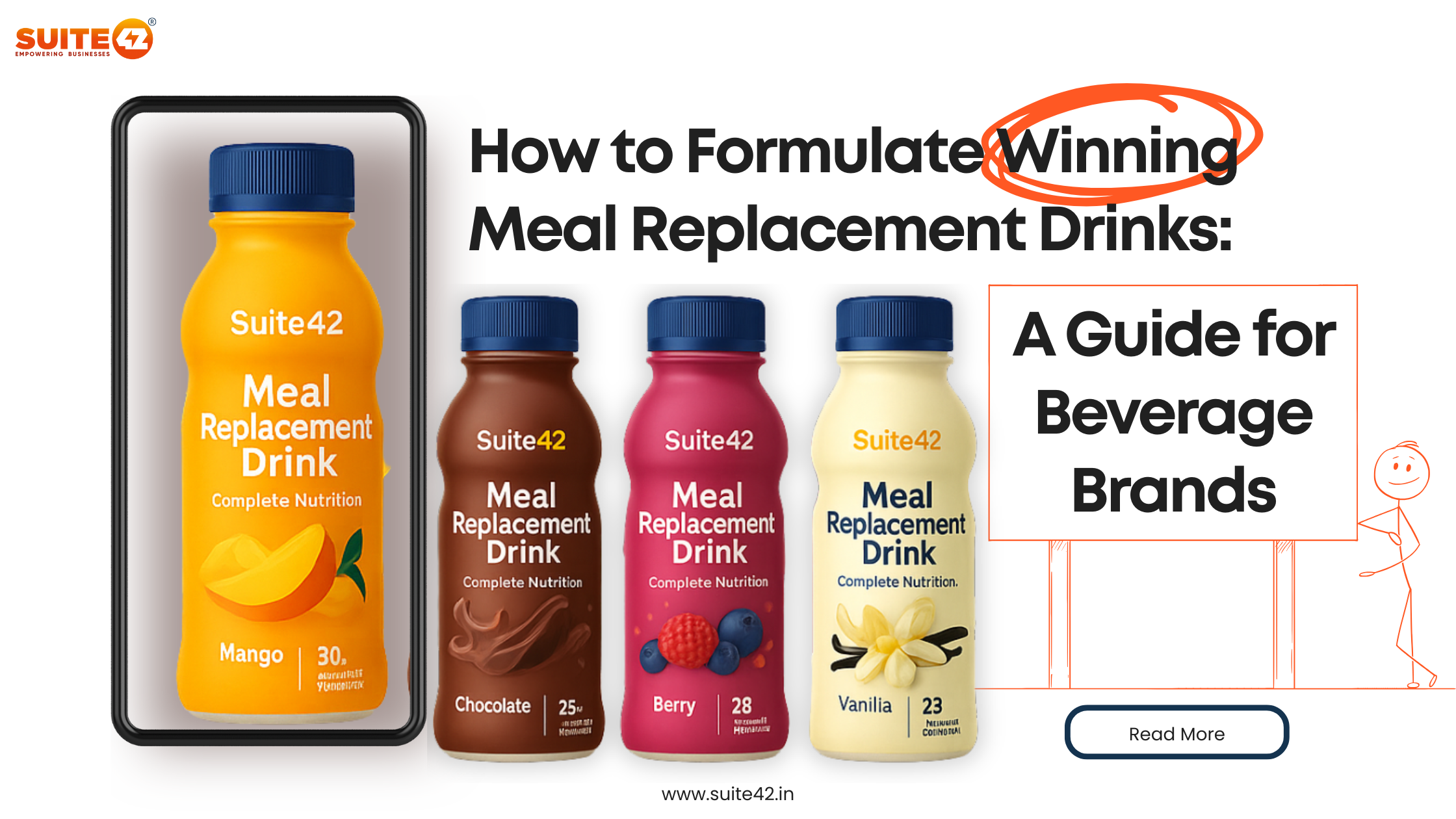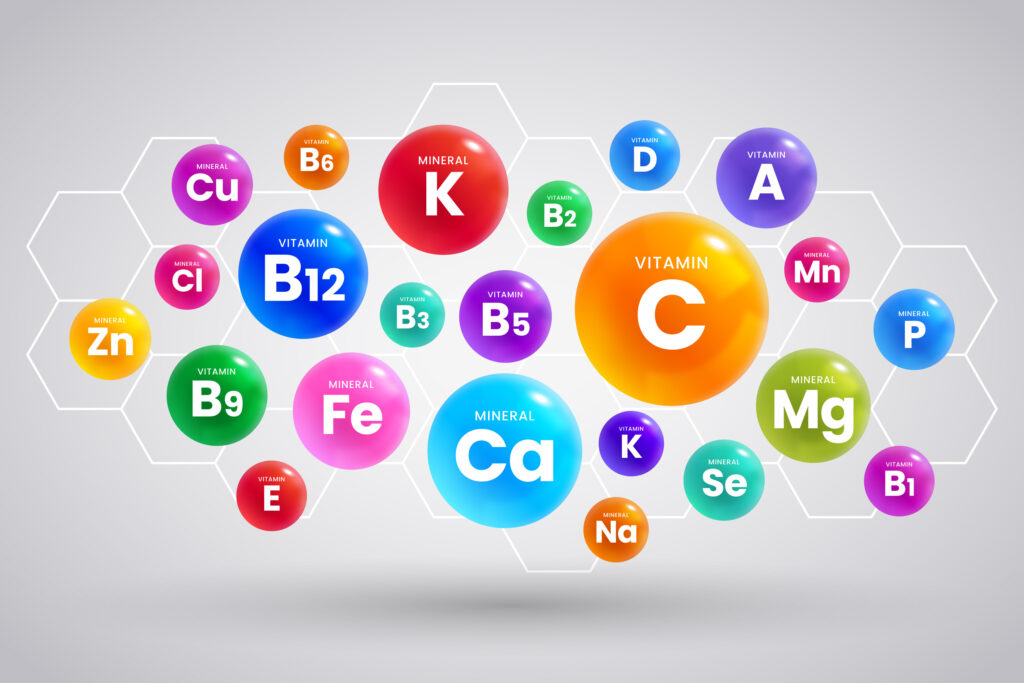
How to Formulate Winning Meal Replacement Drinks: A Guide for Indian Brands
Introduction
The Indian beverage market is rapidly embracing functional products that promise health, convenience, and sensory satisfaction in equal measure. Formulating meal replacement drinks in India requires a nuanced approach that balances nutrient density, flavor innovation, and regulatory compliance to meet diverse consumer needs. Among these, meal replacement drinks have emerged as a significant opportunity, offering consumers nutritionally balanced, ready-to-drink alternatives to traditional meals.
While protein shakes cater primarily to fitness-focused segments and flavoured milks serve indulgent nutrition seekers, meal replacement drinks address broader needs, combining complete nutrition with accessibility. For brands exploring formulating meal replacement drinks, a nuanced approach to nutrient design, flavor innovation, and regulatory compliance is essential to stand out and capture market share.
An article that might interest you: Meal Replacement Drinks: The Rising Demand for Convenience and Nutrition in India
Nutrient Density and Calorie Optimization
Balancing Macronutrients and Micronutrients
Creating effective meal replacement beverage development strategies begins with achieving the right nutritional balance. A successful formulation must deliver adequate proteins, complex carbohydrates, healthy fats, dietary fiber, and a spectrum of essential vitamins and minerals.
Proteins support muscle maintenance and promote satiety, while carbohydrates – preferably from low glycemic index sources – ensure steady energy release. Fats, particularly unsaturated variants, contribute to metabolic health and hormone regulation. Including dietary fiber aids digestion and prolongs feelings of fullness, a crucial factor for meal replacement products.

Micronutrients, including iron, calcium, vitamin D, B-complex vitamins, and zinc, play indispensable roles in supporting overall health. According to Mintel (2023), 63% of Indian consumers prioritize beverages that provide comprehensive nutritional benefits, highlighting the importance of balanced formulations.
Calorie Control for Weight Management and Satiety
Another critical component in formulating meal replacement drinks is calorie optimization. Products designed for weight management or meal skipping must deliver controlled calorie counts while ensuring nutritional adequacy and satisfaction.
This involves precision in ingredient selection and portion control, balancing energy contribution without compromising on macro- and micronutrient needs. Providing clear calorie information on packaging reinforces transparency and supports consumer trust.
Flavor Innovation & Indian Consumer Taste Profile
Cultural and Regional Flavor Adaptations
Taste is a defining element of product success, especially in India’s culturally diverse market. Consumers are far more likely to adopt formulating meal replacement drinks solutions that incorporate familiar, comforting flavours.
Brands can leverage regionally inspired tastes such as mango-cardamom, masala chai, saffron-pistachio, and filter coffee to create an emotional connection with local audiences. By integrating traditional profiles into modern nutritional beverages, brands position themselves as both innovative and culturally relevant, enhancing acceptance and repeat purchase rates.
A Nielsen India study revealed that 59% of consumers prefer health drinks that incorporate local flavors, underscoring the strategic value of this approach.
Sweetener Strategies and Taste Masking
Achieving a palatable flavor profile without relying on excessive sugar is a delicate balance. Using natural sweeteners like stevia, monk fruit, or coconut sugar can effectively replace refined sugar while maintaining taste appeal.
Furthermore, masking the often earthy or bitter notes of plant-based proteins and added micronutrients requires advanced flavor engineering. Encapsulation techniques and the use of natural masking agents help deliver smooth, pleasant taste experiences in functional beverage formulation, avoiding the lingering aftertaste that deters many consumers.
Packaging and Shelf-life Optimization
Enhancing Product Stability and Freshness
Shelf stability is a significant factor in consumer trust and supply chain efficiency. Techniques such as ultra-high temperature (UHT) processing, aseptic filling, and incorporation of natural stabilizers help maintain nutritional integrity and sensory properties over extended periods.
Preventing phase separation, maintaining homogenous textures, and minimizing nutrient degradation are critical challenges in formulating meal replacement drinks. Addressing these effectively ensures that the beverage retains its promised benefits and consistent mouthfeel throughout its shelf life.
Convenience and Sustainability in Packaging
Packaging must cater to India’s fast-paced lifestyles while aligning with growing environmental consciousness. Single-serve, portable formats with resealable closures enhance on-the-go usability, making meal replacements practical for urban professionals and students.

Simultaneously, using recyclable, biodegradable, or plant-based packaging materials signals a brand’s commitment to sustainability. According to Euromonitor, 57% of urban Indian consumers are more likely to purchase beverages with eco-friendly packaging, making this a powerful differentiator in beverage packaging solutions in India.
Ingredients Transparency and Clean-label Trends
Importance of Short, Recognizable Ingredient Lists
Modern consumers increasingly scrutinize ingredient lists, favoring products that are straightforward and free from unnecessary additives. A clean-label approach, characterized by minimal, easily recognizable components, helps position meal replacement drinks as trustworthy and premium.
Brands investing in clean-label meal replacements emphasize their commitment to health and transparency, addressing skepticism around artificial additives and overly processed ingredients. Clearly communicating benefits, such as “no artificial colors,” “no added sugar,” and “natural flavors,” strengthens brand credibility and supports premium pricing strategies.
Fortification with Functional Ingredients while formulating meal replacement drinks in India
Beyond core nutrition, meal replacement drinks can stand out by incorporating bioactive compounds that offer additional functional benefits. Ingredients such as probiotics support digestive health, adaptogens help manage stress, and omega-3 fatty acids contribute to cardiovascular wellness.
Including these advanced components elevates products from basic meal alternatives to comprehensive wellness solutions. However, fortification must be carefully balanced to maintain palatability and comply with regulatory standards governing functional beverage formulation.
An article that might interest you: Protein Shakes: The Next Big Wave in India’s Functional Dairy Market
Regulatory Compliance for Nutritional Claims
FSSAI Guidelines for Meal Replacement Beverages
Compliance with Food Safety and Standards Authority of India (FSSAI) regulations is essential when formulating meal replacement drinks. Guidelines dictate permissible nutrient claims, fortification standards, and labeling practices to ensure consumer safety and truthful marketing.
Claims such as “complete nutrition,” “high protein,” or “low calorie” must be scientifically substantiated and aligned with FSSAI’s nutrient profile thresholds. Misrepresentation can lead to product recalls, legal penalties, and irreversible brand damage.
Allergen Declarations and Consumer Safety
Transparency extends beyond nutrition to allergen safety. Clear labeling of potential allergens, such as soy, nuts, or dairy components, is a legal and ethical obligation. With the rise in dietary sensitivities and intolerances, consumers rely on explicit declarations to make informed purchasing decisions.
Addressing these considerations not only safeguards consumers but also enhances trust and brand loyalty, critical for success in the competitive Indian beverage landscape.
FAQs
What ingredients are important in meal replacement drinks?
Key ingredients include high-quality proteins (whey, plant-based), complex carbohydrates (low glycemic index sources), healthy unsaturated fats, dietary fiber, essential vitamins (B-complex, vitamin D), minerals (iron, calcium, zinc), and sometimes functional additives like probiotics and adaptogens. This balanced composition ensures nutritional adequacy and satiety.
How to make meal replacement drinks nutritious and tasty?
By balancing macronutrients carefully and using regionally inspired flavors like mango-cardamom or masala chai, combined with natural sweeteners such as stevia or monk fruit, brands can create drinks that are both healthy and palate-pleasing. Advanced flavor masking techniques help reduce bitterness from plant proteins.
What packaging solutions are suitable for meal replacement beverages in India?
Single-serve, portable, resealable formats are preferred for convenience, while sustainable materials like recyclable or biodegradable packaging align with Indian consumers’ growing eco-consciousness. Technologies like UHT processing enhance shelf life without compromising nutrition.
What does ‘clean-label’ mean in meal replacement drinks?
Clean-label products have short, recognisable ingredient lists free from artificial colors, additives, and preservatives. This transparency builds consumer trust and supports premium positioning in India’s health-conscious market.

What functional ingredients can be added to enhance meal replacement drinks?
Ingredients such as probiotics for digestive health, adaptogens for stress management, and omega-3 fatty acids for cardiovascular wellness provide additional benefits beyond core nutrition while maintaining regulatory compliance.
What are the FSSAI regulations for meal replacement beverage formulation and labeling?
FSSAI guidelines ensure nutrient claims like “high protein” or “low calorie” are scientifically substantiated and mandate clear allergen declarations for consumer safety. Compliance prevents legal issues and enhances brand credibility in India.
Check out our Categories: Functional Beverages – Meal Replacement Drinks
Conclusion
The rapid growth of the meal replacement drink market in India presents a compelling opportunity for brands to cater to health-conscious and convenience-driven consumers. However, navigating this dynamic space requires specialized expertise from scientifically balanced formulations and culturally relevant flavour innovation to stringent regulatory compliance and scalable manufacturing.This is where Suite42 stands apart. With deep domain knowledge in functional beverage formulation and a robust end-to-end manufacturing infrastructure, Suite42 empowers brands to accelerate their journey from concept to market-ready product. Our dedicated Innovation Centre crafts regionally inspired, nutritionally optimised meal replacements that resonate with Indian tastes while meeting the highest standards of quality, shelf stability, and clean-label transparency.

Our proven experience serving over 50 brands across categories including meal replacements, protein shakes, and functional beverages combined with our capabilities in packaging optimization and supply chain management, positions Suite42 as the ideal partner for brands seeking to innovate and scale confidently in India’s competitive beverage landscape especially for formulating meal replacement drinks.
For visionary companies ready to pioneer the next generation of meal replacement drinks, Suite42 offers unmatched expertise, rigorous quality control, and a collaborative approach that transforms product ideas into market-winning realities. Contact Suite42 today to begin building nutritious, delicious, and trusted meal replacement beverages that meet the evolving demands of Indian consumers.






Leave a Reply